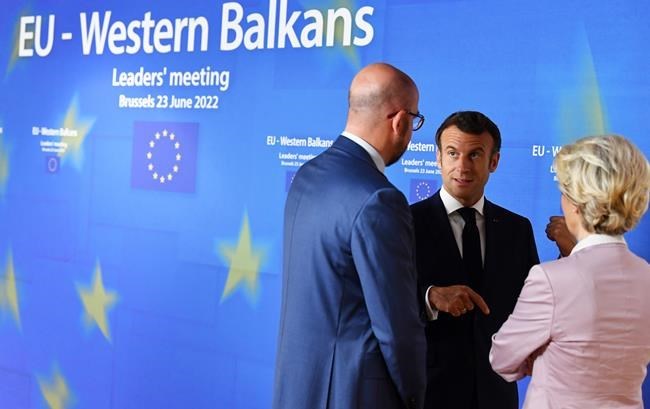
European Commission President Ursula von der Leyen, right, speaks with French President Emmanuel Macron, center, and European Council President Charles Michel prior to a group photo with Western Balkan leaders at an EU summit in Brussels, Thursday, June 23, 2022. European Union leaders are expected to approve Thursday a proposal to grant Ukraine a EU candidate status, a first step on the long toward membership. The stalled enlargement process to include Western Balkans countries in the bloc is also on their agenda at the summit in Brussels. (John Thys, Pool Photo via AP)
Republished June 23, 2022 - 1:57 PM
Original Publication Date June 23, 2022 - 3:11 AM
BRUSSELS (AP) — Leaders from the Western Balkans expressed frustration Thursday that they are still waiting in the European Union’s wings even as candidacy bids by Ukraine and Moldova were swiftly embraced by EU leaders.
A Bulgarian government crisis tarnished a EU summit that was intended to bolster the EU membership hopes of Balkan countries and to show Western resolve in the face of Russia’s war in Ukraine, but instead ended in a frustration for the Balkans.
Bulgaria's parliament passed a no-confidence vote Wednesday in the coalition government of Prime Minister Kiril Petkov, putting up a new obstacle to the long-delayed start of the EU's accession negotiations with North Macedonia and Albania.
All three countries belong to NATO, but Bulgaria has used its status as an EU member to block the other two from proceeding on the path to join the 27-nation European bloc. Bulgaria has a dispute with North Macedonia over ethnicity and language, and its stance has also stalled Albania’s progress because the EU is treating the pair as a political package.
Petkov briefed leaders about the political situation in his country that is blocking discussions on a proposed compromise put forward by France, which hoped it could break the deadlock during the final days of its turn holding the EU Council's presidency.
“I made it clear that this is a decision of the Bulgarian parliament, I alone and the government will not change the Bulgarian position,” he said.
Petkov's words did little to appease Albania and North Macedonia.
“This Bulgaria affair is a disgrace,” Albanian Prime Minister Edi Rama complained. “A NATO country kidnapping two other NATO countries” while there is a war in Europe’s backyard.
Dutch Prime Minister Mark Rutte said his main worry in the Western Balkans was Bulgaria’s blockage, which he said “is creating a lot of irritation, which I understand.” However, he said he thought there was a 50-60% chance of a breakthrough next week.
French President Emmanuel Macron said he believed an agreement was within reach.
Several leaders insisted during Thursday's meeting on the need for the EU to reform the lengthy enlargement process.
Josep Borrell, the bloc's top diplomat, said the rule requiring unanimous approval from current members “is a big problem."
“So, we have to think (about) how we take decisions in the European Union, because we cannot continue with a single country blocking for months and months," he said.
The EU, a political and economic club that boasts the world’s biggest single market, wants to reassure countries in the Balkans that have waited years for admission that the bloc’s doors remain open.
Russia’s war in Ukraine has added to the list of aspiring EU members. The governments of Ukraine, Moldova and Georgia rushed in membership applications after Russia invaded its neighbor.
At their two-day summit that started Thursday, EU leaders made Ukraine and Moldova candidates for membership, the first step in the long accession process and offered Georgia what they called “European perspective.”
The leader of Bosnia’s rotating presidency, Sefik Dzaferovic, congratulated Ukraine and Moldova on their impending status as candidates, but lamented that the same can not yet be said for his own country, which went through a devastating war in the early 1990s.
“It is disappointing for Bosnia that we are not in the same place,” he said, through an interpreter. “Because everything that is happening today in Ukraine is something that Bosnia has already lived through in the past.”
The EU last admitted a new member - Croatia - in 2013. The enlargement process slowed as euroskeptic voices grew in member nations such as Germany, France, Italy and the Netherlands – all founding members of the bloc in the 1950s.
The eurozone debt crisis 10 years ago, a 2015 migration wave into Europe and the U.K.'s 2016 referendum decision to pull out of the EU also contributed to political unease with the bloc’s further expansion.
Kosovo President Vjosa Osmani, whose citizens do not enjoy visa-free travel in Europe, said peace and stability in Europe are inconceivable without integrating Western Balkan nations.
“Kosovo people want more possibilities and progress. They want a no-visa regime to see, feel and live in Europe,” she said, adding that Kosovo citizens “remain isolated at the heart of the continent where they live.”
European Council President Charles Michel, the EU summit chair, said the bloc is committed to rejuvenating the membership bids of Western Balkan countries.
Albania’s Rama said his country's plight should serve as a warning to Ukrainians.
“It’s a good thing to give candidate status, but I hope the Ukrainian people will not make many illusions about it,” Rama said.
___
Mike Corder and Samuel Petrequin in Brussels, Valentina Petrova in Sofia and Llazar Semini in Tirana contributed.
___
Follow AP's coverage of the Ukraine war at https://apnews.com/hub/russia-ukraine
News from © The Associated Press, 2022